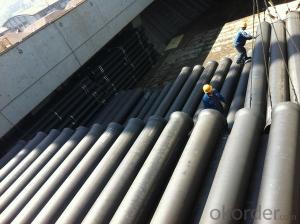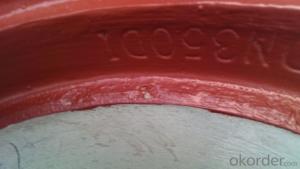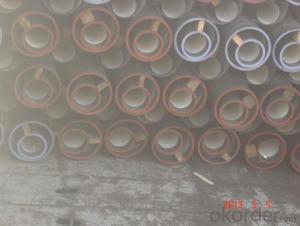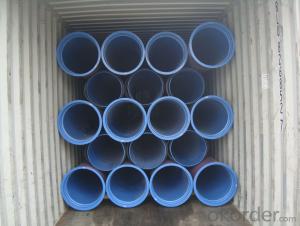T Type Ductile Iron Pipe DN300 Socket spigot pipe
- Loading Port:
- Tianjin
- Payment Terms:
- TT OR LC
- Min Order Qty:
- 25
- Supply Capability:
- 20000 /month
OKorder Service Pledge
OKorder Financial Service
You Might Also Like
1) The standard of pipe: ISO2531:1998, EN545:2006,K9 K8
2) Effective length: 6m/5.7m
3) Inner cement line: Portland cement lineas per ISO4179
4) Zinc coating: at least 130g/m2 as per ISO8179
5) Bitumen painting: at least 70μm as per ISO8179
6)With 102% quantity of NBR, SBR, or EPDM ring asper ISO4633
7) DN80-DN1200
8) Highstrength, lighter than grey iron, good corrosion resistance, no furring, smallflow resistance, easy fixing, long life tome about 100 yeas
9)Checked by automatic inspection equipment
10) Composition:
Chemical composition | |||
Chemical composition | Ductile Cast Iron Pipe (%) | Grey iron pipe (%) | Steel pipe (%) |
C | 3.5-4.0 | 3.2-3.8 | 0.1-0.2 |
Si | 1.9-2.6 | 1.4-2.2 | 0.15-0.4 |
Mn | 0.15-0.45 | 0.4-0.6 | 0.3-0.6 |
P | ≤0.06 | ≤0.3 | 0.02-0.03 |
S | ≤0.02 | ≤0.1 | 0.02-0.03 |
Mg | 0.03-0.06 |
|
|
11) Feature:
Mechanical properties | |||
| Ductile Cast Iron Pipe | Grey Iron Pipe | Steel Pipe |
Tensile Strength(Mpa) | ≥420 | 150-260 | ≥400 |
Yield Strength(Mpa) | ≥300 | No Confirmation | No Confirmation |
Bending Strength(Mpa) | ≥590 | 200-360 | ≥400 |
Elongation (%) | ≥10 | Neglected | ≥18 |
Brinell Hardness(HBS) | ≤230 | ≤230 | About 140 |
12) T type mechanical joint
13) Packing: in bulk or container
PACKING: 1) Pipesare bundled together with the steel belt.
2) Wooden pieces are put between the pipes.
- Q: What material is the cutting tool for ductile iron?
- With pleasure. If necessary, you can also describe your processing work and so on, I help you analyze, recommend a few corresponding knives to you.
- Q: Can ductile iron pipes be used for water main extensions?
- Yes, ductile iron pipes can be used for water main extensions. Ductile iron pipes have excellent strength and durability, making them suitable for carrying water over long distances and withstanding high pressure. They are corrosion resistant and have a long lifespan, making them a reliable choice for water main extensions.
- Q: What's the difference between cast iron pipe and steel pipe?
- Cast iron pipes (Cast, Iron, Pipe), cast cast pipe. Cast iron pipes are used for water supply, drainage and gas transmission lines. They include cast iron pipes and pipe fittings. Labor intensity is small. According to the casting method, it is divided into continuous cast iron pipe and centrifugal cast iron pipe, in which the centrifugal cast iron pipe is divided into sand mould and metal type two kinds. Divided into gray cast iron pipe and nodular cast iron pipe according to different material. According to the interface form, it is divided into flexible interface, flange interface, self anchored interface, rigid interface and so on. Among them, the flexible iron pipes rubber sealing ring; flange interface cast iron pipe flange fixed in the rubber pad, the flange gasket sealing; rigid interface cast iron pipe socket is large, straight pipe is inserted, sealed with cement, this technology has been basically eliminated
- Q: Are ductile iron pipes resistant to external loads?
- Generally, external loads pose little challenge to ductile iron pipes. Ductile iron, a variant of cast iron, undergoes treatment with magnesium and cerium additives to enhance its flexibility and durability. As a result, these pipes possess the ability to endure substantial external pressure and stress without succumbing to cracks or fractures. Ductile iron pipes find extensive implementation in scenarios where heavy loads are anticipated, including underground water distribution systems, sewer lines, and industrial pipelines. Their exceptional resistance to external loads has been thoroughly validated, establishing them as a dependable option for diverse infrastructure ventures.
- Q: What are the typical surge anticipation measures for ductile iron pipe?
- To mitigate potential damage caused by surges or water hammer in ductile iron pipe systems, various techniques can be employed. These measures aim to absorb or redirect sudden pressure changes, preventing pipe rupture or failure. Common surge anticipation measures for ductile iron pipe include: 1. Incorporating air chambers strategically along the pipeline to create a cushion of air that absorbs surge energy. As the pressure wave travels through the pipe, the air compresses, reducing the impact on the pipe and minimizing the risk of damage. 2. Connecting surge tanks, which act as storage reservoirs for excess pressure, to the pipeline. When a surge occurs, the surge tank absorbs the excess water volume, preventing damage to the pipe. The stored water is gradually released back into the system, stabilizing the pressure. 3. Installing surge relief valves in the pipeline to automatically release excess pressure during surge events. These valves open when the pressure exceeds a preset limit, allowing the surge to dissipate harmlessly. Surge relief valves can be adjusted to release the desired amount of pressure, ensuring the safety of the ductile iron pipe. 4. Utilizing water hammer arrestors, which are devices that absorb the shock generated by surges and water hammer. These devices consist of sealed chambers filled with a compressible gas or liquid that absorbs sudden pressure changes. By absorbing the energy, water hammer arrestors protect the ductile iron pipe from potential damage. 5. Using surge suppressors, devices that regulate the flow of water during surge events. Surge suppressors are designed to reduce the speed at which surges travel through the pipe, minimizing the impact on the system. These devices can be installed at critical points in the pipeline to prevent damage to the ductile iron pipe. To determine the most suitable surge anticipation measures for ductile iron pipe installations, it is important to consider the specific requirements of the pipeline system and consult experienced engineers or industry professionals.
- Q: Deep well spiral iron pipe, or ductile iron tube?
- Ductile iron pipes mainly called centrifugal ductile iron pipe, it has the properties of nature, iron and steel, excellent corrosion resistance, good ductility, good sealing effect, simple installation, mainly for municipal, industrial and mining enterprises, water supply, gas, oil etc.. Water supply pipe is the first choice, with high cost performance. Compared with the PE pipe, from the installation time, ductile pipe PE pipe installation is simple and rapid, and after the installation of internal and external pressure bearing better tightness and corrosion resistance; from the point of view, ductile pipe sealing better after installation, but also can improve the corrosion resistance of corrosion protection through a variety of means; from the hydraulic performance, because ductile pipe specifications generally refers to the inner diameter of PE pipe diameter specifications generally refers to the same specifications, because under the condition of ductile pipe can achieve greater runoff; from the installation and maintenance cost, ductile pipe have more favorable price. The main components of ductile iron pipes are carbon, silicon, manganese, sulfur, phosphorus and magnesium. The inner wall of zinc spray, anti-corrosion materials such as cement mortar.
- Q: What is ductile iron?
- Ductile iron is a type of cast iron that has improved strength and ductility due to its unique microstructure. It is created by adding small amounts of magnesium to molten iron, which causes the graphite in the iron to form in a nodular shape rather than in flakes. This nodular graphite structure gives ductile iron its characteristic properties, making it more resistant to cracking and allowing it to be easily machined and welded. Ductile iron is widely used in various industries for its excellent strength, impact resistance, and durability.
- Q: Can ductile iron pipes be used for gravity sewer systems?
- Yes, ductile iron pipes can be used for gravity sewer systems. Ductile iron pipes are known for their durability, strength, and resistance to corrosion, making them suitable for various applications including sewer systems. These pipes have excellent tensile strength and can withstand high pressure and heavy loads, making them ideal for gravity sewer systems where wastewater flows by gravity rather than being pumped. Additionally, ductile iron pipes have a long lifespan and require minimal maintenance, making them a cost-effective choice for sewer infrastructure.
- Q: Will the quality of ductile iron shrink?
- Fool you. It is normal that the surface shrinks and goes down, but it can not be said to be good.
- Q: Advantages and disadvantages of ductile iron pipes
- The ductile iron pipe is widely used not only in foreign countries, and has also been in the country to promote the use of good, in many areas of our country, ductile iron pipe has been widely used in medium and small diameter water supply pipe; compare the performance of ductile iron pipe and steel pipe: steel pipe can be divided into seamed steel pipe and seamless in the water supply pipe, commonly used in welded tube. Compared with ductile iron pipes, the steel tube has the advantages of good toughness, high tensile strength, thin tube wall, high pressure resistance, long pipes and less interfaces. The biggest drawback is that the corrosion resistance is poor and the price is high. So, in general, except for small bore pipes and special projects (such as pipe jacking works);
Send your message to us
T Type Ductile Iron Pipe DN300 Socket spigot pipe
- Loading Port:
- Tianjin
- Payment Terms:
- TT OR LC
- Min Order Qty:
- 25
- Supply Capability:
- 20000 /month
OKorder Service Pledge
OKorder Financial Service
Similar products
Hot products
Hot Searches
Related keywords























